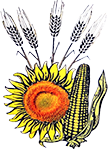Creation of Productive Hybrids of Maize, Dry Tolerance, Heat Tolerance, Diseases and Pests in View of Reducing the Impact of Global Warming on Romania's Agroecosystems
Daniela Horhocea1, Ion Ciocăzanu1, Teodor Martura1, Horia Lucian Iordan1, Caterina Băduț1, Elena Petcu1, Cătălin Lazăr1, Lidia Cană1, Emil Georgescu1, Crucița Sîrca2, Georgiana Negruț3, Claudia Dunăreanu4, Mihai Tilihoi5, Emanuela Lungu6
1Institutul Național de Cercetare-Dezvoltare Agricolă Fundulea
2Stațiunea de Cercetare-Dezvoltare Agricolă Livada
3Staṭiunea de Cercetare-Dezvoltare Agricolă Lovrin
4Staṭiunea de Cercetare-Dezvoltare Agricolă Șimnic
5Staṭiunea de Cercetare-Dezvoltare Agricolă Valu lui Traian
6Staṭiunea de Cercetare-Dezvoltare Agricolă Brăila
Keywords: maize hybrids, yield potential, yield stability, water loss rate.
Abstract: In this context where climate change poses a serious threat to the suitability of species and agricultural ecosystems essential for food production, the creation of high-productivity maize hybrids with tolerance to biotic and abiotic stress is an important goal. Increasing the stability as well as the level of performance of maize production, in the current unfavorable environmental conditions or with a high degree of variability, is only possible by creating genotypes that show tolerance or resistance to abiotic stress.
This paper presents the results obtained in ADER 113/24.09.2019 project, for the achievement of the general objectivet: the creation of productive maize hybrids, tolerant to drought and heat, to diseases and pests, with favorable agronomic properties.
Maize hybrids were experimented in field trials, in enviroments with different climatic conditions at NARDI Fundulea, ARDS Livada, ARDS Lovrin, ARDS Șimnic, ARDS Valu lui Traian and ARDS Brăila.
The following maize hybrids HSF3877-17, HSF1033-17, HSF4075-17, HSF7375-18, obtained by multiannual and multilocational testing and selection, have been shown to be hybrids with tolerance to drought and heat, disease and pest, with high yield potential production and stability and higher grain water loss rate.
These hybrids were selected to be tested in the State Institute for Variety Testing network for Registration.
The parental lines of these hybrids are valuable lines, tolerant of drought and heat, disease and pests, with high General Combining Ability. The improved germplasm obtained will be the initial material for breeding and it will be used for hybridization in order to obtain experimental hybrids but also in cross breeding for recycling inbred lines.
